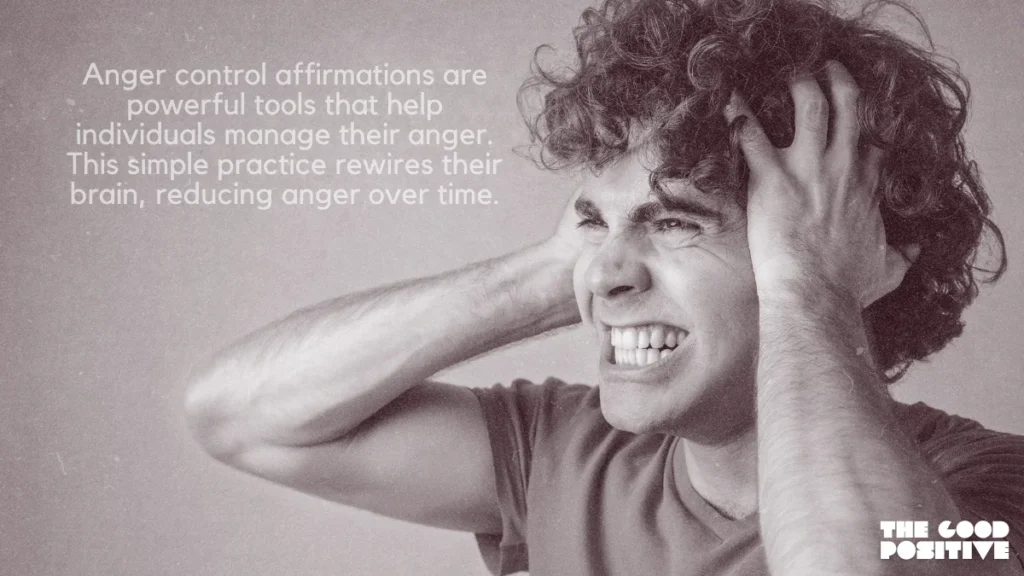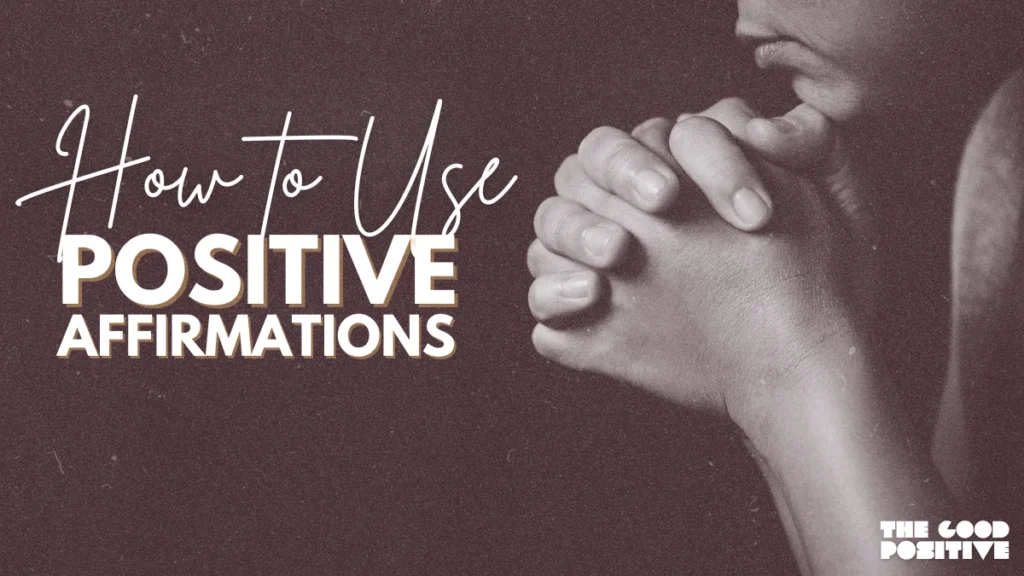Positive Affirmations for Anger: Ever feel like you’re about to explode? Anger can be a real pain, right? It’s like having a storm inside you, ready to cause chaos. And if you let it go unchecked, it can mess with your health.
But guess what? Anger is a normal emotion. Even the calmest people get angry sometimes. The real challenge is keeping that anger in check. Trying to calm down when you’re mad can feel impossible.
But don’t worry! Affirmations can be a solution. These simple phrases can help you control your anger. They’re like magic words that help you calm down and keep your cool.
In this article, we’ll talk about how awesome positive affirmations are for anger management. We’ll show you how to use them and give you a list of affirmations to help you stay calm.
So, get ready! We’re going to turn your anger into peace. ✌️☕🫖
Table of Contents
Affirm More: Positive Affirmations for Dark Circles.
What are Anger Control Affirmations?
Anger control affirmations are powerful tools that help individuals manage their anger. They repeat positive statements to themselves, shifting their mindset. Imagine someone saying, “I am calm and in control.” This simple practice rewires their brain, reducing anger over time. These affirmations work best when used daily, becoming a natural part of one’s routine. They transform anger into calmness and clarity. With consistent use, anger control affirmations help people lead a more peaceful and balanced life. They truly make a difference. 👏
Benefits of Using Positive Affirmations For Anger Management

💡 Ever feel like you’re one wrong move away from turning into the Hulk? But guess what? Positive affirmations can help you keep your cool and save you from those awkward “I’m sorry I lost it” conversations.
Here’s why you should try them:
1. Change Your Thinking: When you’re mad, it feels like nothing can calm you down. Affirmations help you think peaceful thoughts instead. It’s like pressing a mental pause button, helping you cool off quickly.
2. Emotional Shield: Affirmations act like a shield against things that usually make you angry. Imagine having a power that keeps you calm, even when someone cuts you off in traffic. Sounds great, right?
3. Stress Relief: Anger often brings stress along for the ride. Affirmations can help kick stress out, letting you stay calm like a monk. Imagine going through your day without that tight feeling in your chest. Pure bliss!
4. Better Self-Control: Affirmations are like cheering self-talk, boosting your self-control. They remind you that you can handle tough situations without losing it. It’s like a friendly whisper reminding you, “You can handle this!” when you’re about to explode.
5. Improving Relationships: Anger can mess up relationships. Affirmations help you respond with kindness instead of anger, making you a better friend, partner, and coworker. People might start saying, “Hey, you’re so calm!” instead of avoiding you.
100 Positive Affirmations for Anger Management

🌟 Feeling angry lately? Maybe it’s traffic, a spilled drink, or that one co-worker who drives you nuts. Anger can sneak up on you fast. Here is a list positive affirmations for anger control. Think of yourself as a calm, wise guru. Yep, that’s the goal!
📍 Before you jump in, here’s a tip: 🔖 Bookmark this page and check back every day for 21 days. You’ll want this trick in your back pocket. Just a few minutes a day can make a huge difference.
🚩 And hey, if you want more tips and stories on mental health, join our newsletter. It’s filled with useful advice, personal stories, and solutions to keep your mind happy and healthy. Don’t miss, subscribe now! 🧠📩🔔
1. “I am in control of my anger today.”
2. “My calm mind brings me inner peace.”
3. “I practice patience in difficult situations daily.”
4. “Mindfulness helps me manage my anger effectively.”
5. “I embrace relaxation and let go of anger.”
6. “Breathing deeply calms my mind and body.”
7. “Meditation soothes my anger and promotes peace.”
8. “I choose empathy over anger in every interaction.”
9. “Forgiveness frees me from anger and resentment.”
10. “Reflection helps me understand and manage my anger.”
11. “I gain perspective and release my anger easily.”
12. “Healthy communication reduces my anger and frustration.”
13. “Assertiveness allows me to express my feelings calmly.”
14. “I set boundaries to protect my emotional well-being.”
15. “Journaling helps me process and release my anger.”
16. “I prioritize self-care to manage my anger effectively.”
17. “Therapy supports my journey to anger management.”
18. “Exercise releases tension and calms my anger.”
19. “Distraction techniques help me control my anger.”
20. “I use humor to diffuse my anger gently.”
21. “Gratitude shifts my focus from anger to appreciation.”
22. “Understanding others helps me manage my anger better.”
23. “Awareness of my triggers helps prevent anger outbursts.”
24. “I practice compassion towards myself and others daily.”
25. “Flexibility in my thinking reduces my anger.”
26. “I listen actively to avoid miscommunication and anger.”
27. “Support from loved ones helps me manage anger.”
28. “I seek balance in my emotions every day.”
29. “Detachment from negativity keeps my anger at bay.”
30. “Acceptance of others reduces my feelings of anger.”
31. “Positive thinking helps me control my anger.”
32. “I manage my frustration with calm and patience.”
33. “I recognize and control my irritability effectively.”
34. “I channel my aggression into productive activities.”
35. “I manage impulsiveness with thoughtful reflection.”
36. “I release bitterness to embrace peace and calm.”
37. “I transform rage into constructive energy daily.”
38. “I reduce tension through relaxation techniques regularly.”
39. “I resolve conflict with calm and understanding.”
40. “I prevent miscommunication by communicating clearly.”
41. “I release blame and focus on solutions instead.”
42. “I let go of guilt to embrace inner peace.”
43. “I manage my anxiety with calm and mindfulness.”
44. “I counteract depression with positive thinking daily.”
45. “I overcome isolation by connecting with others.”
46. “I release shame and embrace self-compassion.”
47. “I avoid overreaction through mindful breathing practices.”
48. “I manage stress with calm and relaxation.”
49. “I release helplessness by taking control of my anger.”
50. “I transform criticism into constructive feedback.”
51. “I reject revenge and choose peace instead.”
52. “I practice patience in all challenging situations.”
53. “I acknowledge hurt and choose to heal.”
54. “I resolve misunderstanding with clear communication.”
55. “I let go of disappointment to find peace.”
56. “I embrace calmness to manage my anger effectively.”
57. “I use deep breathing to release my anger.”
58. “I choose relaxation over tension every day.”
59. “I practice mindfulness to control my anger.”
60. “I approach frustration with a calm mind.”
61. “I transform irritability into patience and understanding.”
62. “I manage my anger with positive affirmations daily.”
63. “I embrace empathy to reduce my anger.”
64. “I let go of anger with forgiveness.”
65. “I practice self-care to prevent anger buildup.”
66. “I find peace through meditation and relaxation.”
67. “I exercise regularly to manage my anger.”
68. “I use distraction to control my anger.”
69. “I choose humor to diffuse anger quickly.”
70. “I focus on gratitude to release my anger.”
71. “I practice assertiveness to express my feelings calmly.”
72. “I set boundaries to protect my emotions.”
73. “I journal my feelings to manage my anger.”
74. “I seek therapy to understand my anger.”
75. “I use positive thinking to overcome my anger.”
76. “I release bitterness for a peaceful mind.”
77. “I choose flexibility to reduce my anger.”
78. “I manage my aggression with healthy outlets.”
79. “I listen actively to reduce conflict.”
80. “I find balance in my emotional responses.”
81. “I practice detachment from negative emotions.”
82. “I accept situations I cannot change peacefully.”
83. “I focus on understanding to reduce my anger.”
84. “I embrace calm to manage my frustration.”
85. “I transform tension into relaxation daily.”
86. “I resolve conflict with empathy and patience.”
87. “I communicate clearly to avoid misunderstandings.”
88. “I let go of guilt and embrace self-forgiveness.”
89. “I manage anxiety with mindfulness and calm.”
90. “I counteract depression with positive affirmations.”
91. “I connect with others to avoid isolation.”
92. “I practice self-compassion to release shame.”
93. “I avoid overreaction by staying mindful.”
94. “I manage stress with calm and positive thinking.”
95. “I take control of my anger to avoid helplessness.”
96. “I transform criticism into a learning opportunity.”
97. “I reject revenge and choose understanding.”
98. “I practice patience to manage my anger.”
99. “I acknowledge hurt and choose to heal.”
100. “I let go of disappointment and embrace peace.”
How To Use Positive Affirmations For Anger Management?

💡 No sweat! Positive affirmations can help you cool down. Here’s how you can use them:
- Catch Anger Early: When you feel your anger rising, picture a huge STOP sign. Your brain will take a pause, giving you a chance to calm down. Stop the anger before it turns into a volcano.
- Morning Pep Talks: Start your day with a little self-encouragement. Talk to yourself while you brush your teeth. It might feel weird, but it’s like giving your mind a morning coffee.
- Sticky Note Reminders: Write positive messages on sticky notes and put them everywhere. On your mirror, fridge, even your computer. These little reminders will keep you on track.
- Replace Negative Thoughts: When angry thoughts pop up, immediately replace them with something positive. It’s like playing a game of whack-a-mole with your brain.
- Breathe and Repeat: When you’re about to lose it, take a deep breath and say something calming. It’s like hitting the reset button. You might feel silly, but it’s better than yelling.
- Celebrate Small Wins: Notice when you’ve managed to keep your cool? High-five yourself! Celebrate those victories, no matter how small. It’s all progress, baby!
FAQ’s

What is the root of anger?
Anger often stems from feeling threatened, frustrated, or helpless. It can be triggered by stress, past trauma, unmet needs, or perceived injustices. Our brain’s fight-or-flight response kicks in, making us react. Understanding these roots helps in addressing and managing anger effectively.
How to fix anger issues?
To fix anger issues, start by identifying triggers and practicing mindfulness. Techniques like deep breathing, exercise, and therapy can help. It’s crucial to develop healthy communication skills and find constructive outlets for anger. Patience and consistency are key!
What are 7 ways to manage anger?
1. Deep breathing
2. Mindfulness meditation
3. Regular exercise
4. Talking it out
5. Practicing empathy
6. Creative outlets (art, music)
7. Professional therapy
What mantras reduce anger?
Mantras like “I am calm,” “Peace begins with me,” “Let go,” “This too shall pass,” and “I choose serenity” can be effective. Repeating these phrases helps shift focus from anger to calmness, fostering a sense of control and inner peace.
How do I turn my anger into positive?
Transform anger by channeling it into productive activities like exercise, creative projects, or problem-solving. Use anger as motivation to address issues constructively. Reflect on the cause, and turn that energy into a force for positive change and personal growth.
How to calm down anger?
Calm anger by practicing deep breathing, taking a timeout, and engaging in physical activity. Try mindfulness or meditation to center yourself. Talk to someone you trust, or use humor to diffuse the situation. The key is to interrupt the anger cycle with calming activities.
How to stop being so angry?
To stop being so angry, recognize your triggers and develop healthy coping mechanisms. Practice relaxation techniques, improve communication skills, and engage in regular physical activity. Seek professional help if needed. Fostering a positive mindset and practicing gratitude can also reduce overall anger levels.
Do affirmations work for anger management?
Yes, affirmations can be powerful tools for anger management. Phrases like “I choose peace,” “I am in control,” and “I release my anger” can reshape your thinking. Regularly repeating affirmations helps reinforce positive thinking patterns and reduces the intensity of anger over time.
What are daily affirmations for anger management?
“I remain calm in all challenging situations.”
“Peace and patience guide my actions daily.”
“I control my reactions with thoughtful responses.”
“Each breath brings me closer to tranquility.”
What are positive affirmations for anger control?
“I choose peace over anger every moment.”
“Calmness fills my mind in stressful times.”
“I respond with patience and understanding always.”
“I let go of anger and embrace peace.”
What are positive affirmations for anger kids?
“I stay calm even when I’m upset.”
“I choose kind words when I’m angry.”
“I can express feelings without getting mad.”
“I breathe deeply and feel my calmness.”
What are positive affirmations for dealing with anger?
“I handle anger with grace and composure.”
“I transform anger into positive energy daily.”
“I focus on solutions, not anger problems.”
“I release anger and embrace inner peace.”
What are affirmations to overcome anger?
“I conquer anger with calm and clarity.”
“Peaceful thoughts replace my anger easily.”
“I forgive others and release all anger.”
“My mind is calm and anger-free now.”
What are affirmations to reduce anger?
“I choose peace and let go of anger.”
“Calmness surrounds me in difficult moments.”
“I breathe deeply and release all tension.”
“My heart is full of patience and understanding.”
What are positive affirmations to stop anger?
“I replace anger with peaceful thoughts immediately.”
“Calm responses are my natural choice always.”
“I choose love and kindness over anger.”
“Peaceful energy flows through my entire being.”
What are affirmations to release negative energy?
“I release negativity and embrace positive energy.”
“Positive vibes replace all my negative thoughts.”
“I let go of negative emotions peacefully.”
“I attract positivity and radiate positive energy.”
What are affirmations for anger and frustration?
“I handle frustration with patience and calm.”
“I turn anger into productive energy always.”
“I stay composed during moments of frustration.”
“My calm mind overcomes anger and frustration.”
What are affirmations for controlling emotions?
“I control my emotions with ease and grace.”
“I remain calm and balanced under pressure.”
“I respond thoughtfully, not react emotionally.”
“My emotions are balanced and well-managed.”
What are calming affirmations for anger?
“I am calm and at peace always.”
“I breathe deeply and find my calmness.”
“Peace and tranquility fill my mind daily.”
“I remain serene in every situation faced.”
Conclusion
We all get mad sometimes, right? Maybe your favorite show got canceled, or you stubbed your toe. But anger doesn’t have to take over your day! Affirmations can help you switch from rage mode to calm mode.
Positive affirmations for anger management are like a mental reset button, helping you stay cool when things heat up. Plus, they’re totally free! No need to buy anything.
Next time you feel the anger rising, just breathe, repeat your affirmations, and watch your anger simmer down. Managing anger can be as easy as talking to yourself. And if anyone gives you weird looks, just smile and tell them you’re on a self-improvement journey.
Stay calm, my friend! ❤️😊✨
Affirm More: Positive Affirmations for Jealousy.

Aldvin is the proud owner of “thegoodpositive.com.” A passionate writer and supporter of body positivity. Advocate of plus-size fashion. He’s mission is to curate the latest trends and timeless fashion for plus size women. He wants to inspire confidence and creativity through fashion, helping curvy women express their unique personalities with every outfit.

